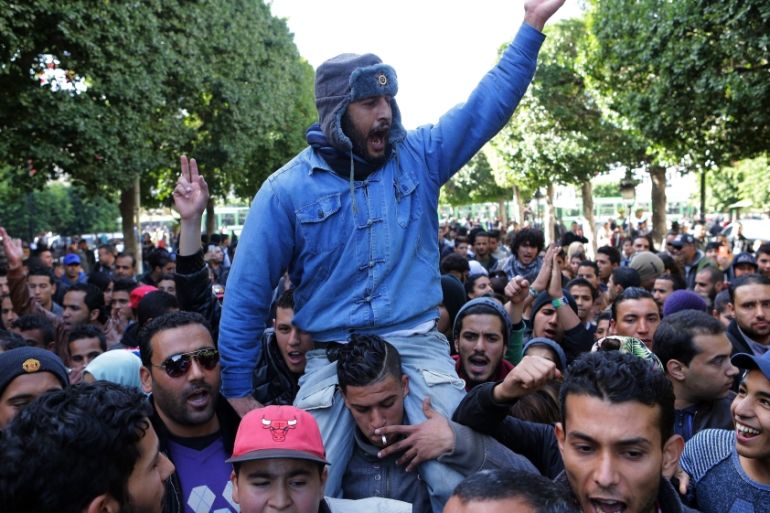Tunisia unemployment protests spread to capital
Suicide attempts have been reported as protests spread to cities across Tunisia amid anger over unemployment.

Protests over unemployment rates in Tunisia, which started in the western Kasserine province, have intensified and spread to other parts of the country.
Solidarity rallies were held in cities including Tunis, Sidi Bouzid and Gafsa on Thursday, with several reports of suicide attempts as frustration over the lack of jobs boiled over.
Keep reading
list of 4 itemsPalestinian Prisoner’s Day: How many are still in Israeli detention?
‘Mama we’re dying’: Only able to hear her kids in Gaza in their final days
Europe pledges to boost aid to Sudan on unwelcome war anniversary
A policeman was reportedly killed when demonstrators overturned his car in the town of Feriana.
Protests and clashes with security forces started in Kasserine on Saturday after the death of an unemployed man who was electrocuted on top of a power pole near the governor’s office.
|
|
| Tunisia police fire tear gas at protesters |
Ridha Yahyaoui, 28, was protesting because his name was removed from a list of potential recruits for coveted public sector jobs.
The government has ordered an investigation into the circumstances surrounding his death.
Speaking to Al Jazeera on Thursday night, Wajdi Khadraoui, a Kasserine-based activist, said that protests were ongoing “in neighbourhoods throughout Kasserine”.
The city of Kasserine is near the Algerian border, and like in many of the country’s peripheries, locals feel neglected by the government.
READ MORE: Extinguishing the flames of the Arab Spring
Al Jazeera’s Hashem Ahelbarra, reporting from Kasserine, said: “People are saying that they took to the streets in 2010 for the sake of a better life, but they feel like they have been abandoned by consecutive governments that took over, and that the only way out is to take to the streets.”
Our correspondent saw at least two people about to jump from a high building in suicide attempts, but the pair were rescued.
He said that a crowd of hundreds gathered outside the governor’s office in Kasserine to demand information on a government announcement the previous day of plans to create 5,000 jobs.
Ahelbarra said that the average rate of unemployment was about 15 percent in Tunisia but that in Kasserine it was higher, at 30 percent.
“It’s the same reasons as always – unemployment and frustration due to no progress. People feel like five years after the revolution, nothing has changed,” Tyta Aghrebi, 25, a teacher in Tunis, told Al Jazeera.
She said that she had heard of at least seven to nine suicide attempts in recent days.
In the face of the unrest, Prime Minister Habib Essid cut short a European tour to return home on Thursday.
READ MORE: My Arab Spring: Tunisia’s revolution was a dream
Tunisia’s 2011 revolution was sparked when Mohamed Bouazizi, 26, a street vendor, fatally set himself on fire in protest at police harassment.
|
|
| Inside Story – Where is post-revolution Tunisia headed? |
Demonstrations spread throughout the country and eventually ended the 23-year presidency of Zine El Abidine Ben Ali.
The post-revolution transitional period has brought about uncertainty, economic instability and sporadic political violence.
Aymen Abderrahman, 28, a Tunis-based activist, said that “frustration and total despair” were driving the protests.
“The unemployed people, who are living in the same conditions [as before the 2011 uprising], are seeing a spark to bring back to life the revolutionary past,” he told Al Jazeera.
“If the strike survives this weekend, then it will last long.”
Additional reporting by Patrick Strickland: @P_Strickland_